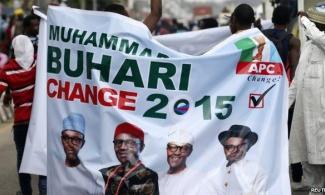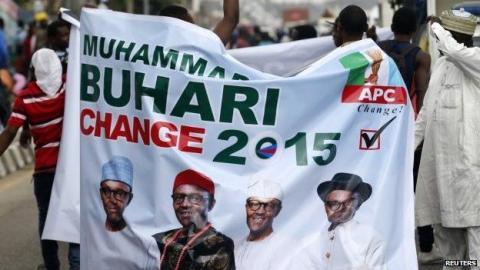
It is individuals who think like Abiodun Ladepo who ruin Nigeria.
I was dismayed when I first read the article Mr. Ladepo had published on Sahara Reporters. It was shocking to see that such an atrocious account on the current struggle in the Niger Delta can be spewed by someone calling himself a Nigerian.
Ladepo begins his article by detailing how the Nigerian government, under President Muhammadu Buhari, is seeking to clean up the ecological disaster brought on by multinational oil companies and the complicity of past Nigerian governments. Even if Buhari’s efforts succeed, Ogoniland does not constitute a sizeable portion of the Niger Delta. In fact, it is roughly 1/27th of the region. To deem Buhari’s move a job well-done ignores the role that he played, as a former dictator and oil minister, in the pollution which has wrought great damage upon Ogoniland and other places in the Niger Delta. Millions of barrels of oil and been spilled into the soils and creeks of the Delta. Carcinogenic gas flaring continues to poison the people of the Niger Delta. We should not be impressed by Buhari with this action. Instead, we should be asking, “What else will you do?”.
The following portion of the article is disturbing: “He can ask the leaders of any country who has a problem with strafing your communities with helicopter and aircraft fires if they would allow their countries’ infrastructure to be so routinely destroyed by a bunch of hoodlums under the guise of freedom fighters.” Essentially, he asserts the utilization of brutal military tactics and the possibility of human rights violations are within the rights of the Nigerian state to fight against those who interfere with its economic interests. For Ladepo, the life of a Niger Deltan is cheap compared to a barrel of oil. He is no Nigerian nationalist. Rather, he a servant to brutality. The author then dares to ask what the United States would have done if Texan militants had destroyed oil infrastructure in their state. No such comparison is warranted. After all, the United States actually practices federalism unlike Nigeria which merely masquerades as a country founded upon federalism. It is the centralization of power at the centre in Nigeria to the detriment of Nigeria’s peoples which spurs revolt. If Nigeria were truly a federal state, more than 13 per cent of oil derivation which be provided to the people of the Niger Delta who receive 13 per cent of the revenue, but 100 per cent of the pollution caused in part by the Nigerian government’s willful neglect of the region for decades which caused groups like MEND and now the Niger Delta Avengers to take up arms against the Nigerian government.
He then bemoans the poor governance experienced by the Niger Delta and the massive amounts of wealth which has been stolen by the political elites of the region. Is bad governance specific to a single region of Nigeria? How many Nigerian critics of governance of the Niger Delta are also wise enough to criticize the failure of governance in other parts of Nigeria which has led to Boko Haram, Ansaru and others which wish to undermine and destroy the Nigerian state. A similar argument to the foolishness uttered by Ladepo would be, “Northerners are getting what they deserve from Boko Haram and Ansaru.
After all, is Buhari not the president? Wasn’t Yar’Adua their president in 2009 when Muhammad Yusuf was killed by the Nigerian police?”.
Governance issues in Nigeria which incentivize the taking up of arms against the government are not unique to the Delta region. The near ubiquity of this phenomenon should make Nigerians ask greater questions about the role the government plays in stoking rebellion, yet Ladepo shirks from this opportunity to assess the true nature of governance in Nigeria. It is a pity.
Another pitiable action is Ladepo’s attempt to humorously reference the Nigerian Civil War which killed 2 million of your fellow Nigerians. Ladepo’s callousness is noted.
The most grievous part of your so-called article is your attempt to malign the name of Ken Saro-Wiwa. In this portion of the article, Ladepo becomes a willing accomplice to the dictator Sani Abacha. Ladepo suggests that Saro-Wiwa was involved in the deaths of four Ogoni notables in 1994. If Ladepo actually conducted research upon the topic, he would discover that the Nigerian government and Shell’s Nigerian subsidiary bribed witnesses who later confessed their criminal actions to ‘judicially murder’ Saro-Wiwa.
Saddest aspect of Mr Ladepo’s article is how says that Nigeria will not lose and that Nigeria has a president who will defend the integrity of the state at all costs. The fact is, for decades Nigerians have been losing. Nigerians who are share common citizenship Mr Ladepo have been marginalized, terrorized and killed by various iterations of the Nigerian government. Moreover, Nigeria is losing because its citizens are often willing to create falsehoods and acclaim acts of cruelty in order to support a notion of national unity which is actually the perpetuation of extractive predatory economics. Instead of Nigerians asking, “Why are my fellow citizens rebelling against the state?”, non-thinkers like Ladepo cry out, “Crush them!”. Prioritizing notions of state security over human security or flourishing has been a long-running theme among Nigerian governments. However, the cost of this deadly practice is thousands of Nigerian deaths.
Examples of which have been recently seen in Zaria, Aba and Onitsha. Ogoniland also experienced ‘punitive expeditions’ conducted by their fellow Nigerians when they interfered with the plans of those who would “protect Nigeria at all costs”. Nigerians cannot go on like this. Nigerians can no longer afford to have individuals like Mr Ladepo call themselves Nigerians. If the viability of Nigeria rests upon persons such as Mr Ladepo, I have grave doubts about Nigeria’s ability to endure.
Email: [email protected]
